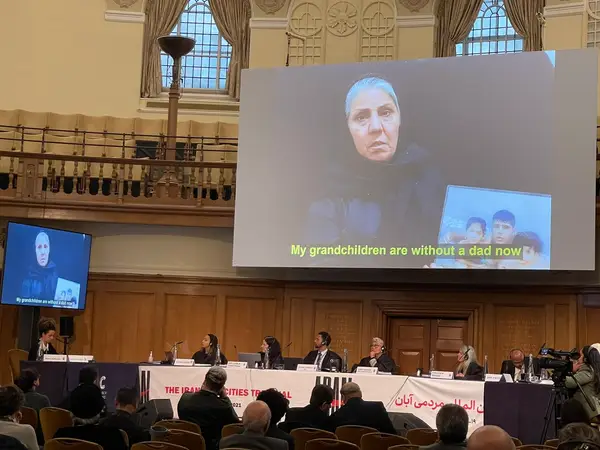Rights activists say the Iran Atrocities Tribunal is meant to bring the people's voice to the world and to make Islamic Republic authorities accountable.
The Iran Atrocities Tribunal convened in London Wednesday with testimonies from family members who sent recorded messages or testified via video on the alleged killing of their relative in protests in November 2019.
Regina Paulose, a member of the tribunal's counsel and an attorney who focuses on genocide and crimes against humanity, told Iran International that there was no “question of impunity” for Iran’s leaders. "The people's tribunal makes it known that… the leaders have to be accountable," she said.
While ‘atrocity’ is not a legal term, the tribunal follows the model of the Russell Tribunal on Palestine, which was held 2009 to 2014 to review alleged Israeli war crimes against Palestinians following the notion of ‘people’s tribunals’ advocated by British philosopher Bertrand Russell.
"When a similar tribunal was held for Palestine, [Iran's] Press TV was probably the only media outlet in the world that broadcast it live," journalist Mehdi Mahdavi-Azad said. "When such tribunals are concerning itself, they boycott them and make no mention at all.”
Mahboubeh Ramezanifard, mother of Pejman Gholipour, told the tribunal in a recorded message that she had kept her son’s “bloody clothes to show the world as evidence that my child was murdered.” Ramezanifard said her son’s jacket had “holes on both sides because he was shot with a live bullet."
In the afternoon session, United States-based opposition activist Masih Alinejad testified from her “own findings” that the Iranian authorities had made the families of those killed in the protests bury the corpses in remote places. Alinejad said this was “psychological torture.”
Alinejad also said “authorities” had threatened families not to talk to foreign media and has asked two for the cost of the bullet used to kill them. "The families believe there is no justice in Iran,” she said. “You can take your complaint against murderers to the murderers themselves.”
"We want this tribunal to hear the truth from witnesses," Shadi Sadr, a director of Justice for Iran, one of the tribunal organizers, told Iran International Wednesday.
Speaking via video to the tribunal, Nahid Shirbisheh said her son Pouya had been shot in the head while protesting peacefully alongside his mother in Karaj. She said hers was the first family to openly tell the world about “the atrocities of the Islamic Republic.”
"We didn't fear the consequences,” she said. “As a result, we have constantly been threatened and detained. Pouya's father is still in prison, in solitary confinement for seeking justice.”
The tribunal will in the next few days also hear the testimony of three Iranian police officers, a judicial official, and two doctors who tended to the wounded at their offices or homes to avoid arrest. These witnesses have travelled to London secretly.
